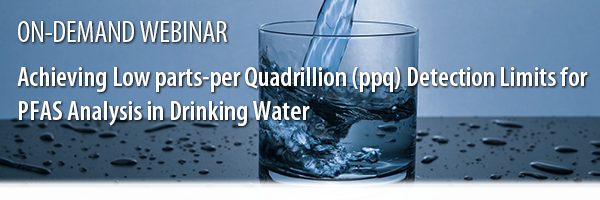Learn some new ways to reduce contamination and modify sample preparation by elevating the sensitivity of mass spectrometers to reach low, single digit ppq (pg/L) detection levels for PFAS analysis in drinking water by watching this on-demand webinar.

Format: On-demand
Duration: Approximately 1 hour
In June 2022, the US EPA announced new drinking water advisory levels (HALs) for 4 per- and polyfluoroalkyl substances (PFAS). In particular, perfluorooctanoic acid (PFOA) required a detection limit of 4 parts-per-quadrillion (ppq).
The scientific community were collectively shaken. These trace-level ppq levels for PFOA and PFOS in the 2022 EPA drinking water HALs demand an unprecedented level of cleanliness and instrument sensitivity – which ultimately necessitates newer, robust analytical techniques. SCIEX and Eurofins partnered up to discover new ways to reduce contamination, modify sample preparation, and elevate the sensitivity of mass spectrometers to reach low, single digit ppq (pg/L) detection levels.
By viewing this presentation you will learn about:
- how SCIEX and Eurofins became the first to market achieving 4 ppq detection levels
- about the advantages of a positive-pressure, HEPA-filtered clean room
- why a modified SPE method requiring only a 25x concentration step eliminated the need for sample blow down and reconstitution
- how the SCIEX 7500 system was able to detect single digit pg/L levels
- how can we minimize contamination for challenging methods.
If you have a colleague who may also be interested in the subject of this webinar, please recommend it to them by using the link below.
The Presenters
 Andrew Patterson
Andrew Patterson
Technical Director, Eurofins Specialty Services
Andrew brings 20 years of experience in the environmental industry with a focus on HRGS/HRMS analyses and LC-MS/MS analysis of PFAS. Before Eurofins, Andrew was the Technical Director for Vista Analytical Laboratory in Northern California where he developed all aspects of PFAS capability within the lab. Before Vista, Andrew worked in both the HRMS and LCMS laboratories at Alta Analytical, with a focus on developing fringe EPA methods (1614, 1699, 1694). Andrew holds a Bachelor of Science in Microbiology/Biochemistry from Cal Poly San Luis Obispo.
 Craig Butt
Craig Butt
Applications Lead - PFAS, SCIEX
Craig is currently the applications lead for all things PFAS at SCIEX. He has contributed to a variety of PFAS-specific applications, including EPA methods 537.1 and 533. In his 20 years of mass spectrometry experience, Craig has published 48 peer-reviewed manuscripts. Craig obtained his PhD in environmental chemistry at the University of Toronto, investigating the fate of PFAS in biological systems. He was then a post-doc at NSERC and Duke, before joining SCIEX and continuing to collaborate with industry experts.
Sponsor:






